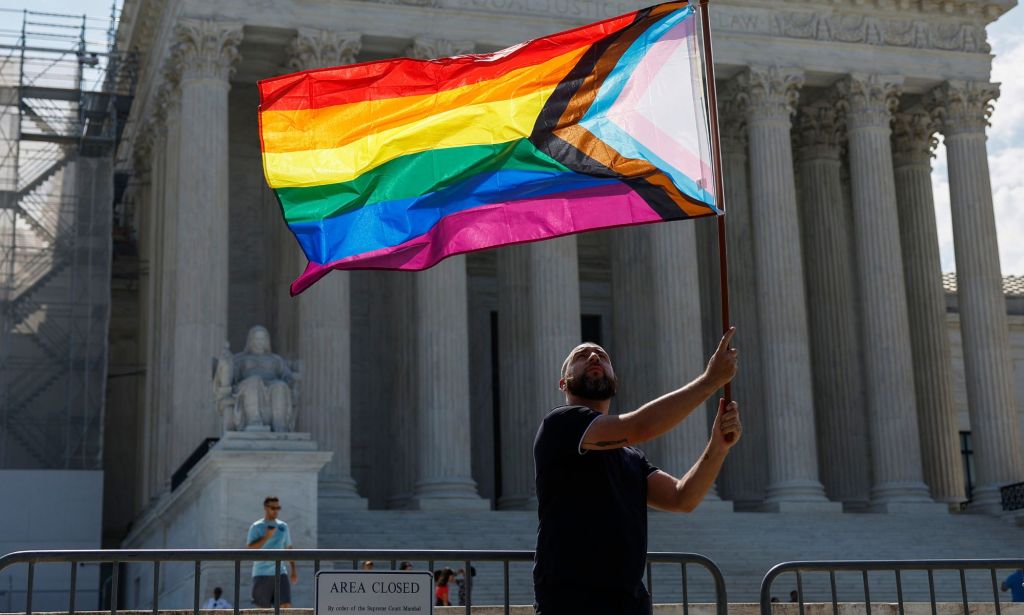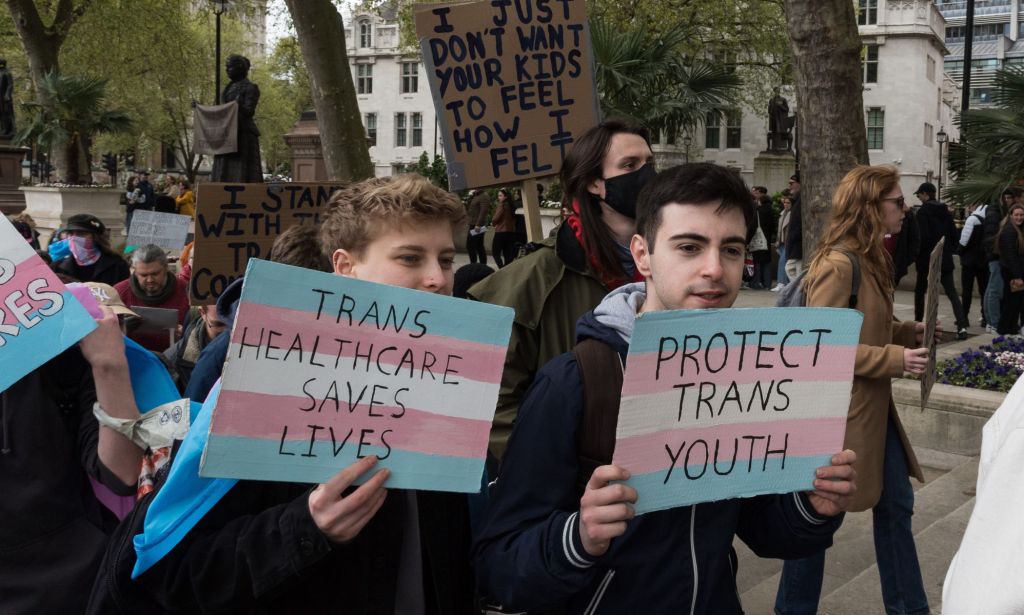Trans Day of Visibility: 7 positive, very real facts about trans people to remind you we’ll be OK

Trans Day of Visibility: 7 positive facts. (Getty)
In an era of immense difficulty for the community, it can be difficult to remember Trans Day of Visibility is as much about positivity as it is about awareness and resistance.
The annual awareness day, which takes place on 31 March every year, was founded by activist Rachel Crandall Crocker as an alternative to the comparatively bleak awareness holidays dedicated to trans people, such as Trans Day of Remembrance.
As Kasey Suffredini, chief officer of prevention at the Trevor Project tells PinkNews, Trans Day of Visibility is a time to remind everyone that “the headlines aren’t the full story.”
“Even amidst the attacks we’re experiencing, our community continues to make progress,” he says. “In 2025, trans people are holding elected offices, appearing before the Supreme Court, being featured on covers of major magazines, and so much more.
“Throughout history, we have always found a way to go about our daily lives, take care of our families, contribute to our communities, find joy and thrive. This legacy matters. For any transgender young person who is feeling alone or afraid right now, I want you to know that you are part of a brave and resilient community of people that are here to support you exactly as you are.”
In keeping with Crocker’s mission for the day to be a time to celebrate our lives and achievements, here are a few positive facts about the trans community to remind you that its not all doom and gloom.
Majority of non-LGBTQ+ Americans say they support trans people

As part of its 2024 Accelerating Acceptance report, GLAAD reported that the vast majority of non-LGBTQ+ Americans would support a person coming out as trans or non-binary at 77 per cent.
91 per cent responded saying that LGBTQ+ people deserve to “live their lives free from fear,” while 89 per cent agreed that the community should “have the freedom to live their lives and not be discriminated against.”
On specific issues, 95 per cent agreed that schools should be a safe space for all youth, including trans and non-binary youth, while 93 per cent said children should be taught acceptance and kindness.
More Gen Z Americans identify as LGBTQ+ than as Republican
The US Republican Party has undoubtedly been at the forefront of the attack on LGBTQ+ rights in the US and beyond, but the tide is shifting, according to research.
A poll released by Axios in January 2024 found that Gen Z – those born between 1997 and 2012 – are more likely to identify as LGBTQ+ than as Republican.
The survey of 6,000 young people across the US found that 21 per cent of Gen Z Americans identify as Republican, while 28 per cent are LGBTQ+ in some capacity. Comparitevly, 32 per cent of baby boomers – those born between 1946 and 1964 – identify as Republicans, while just 4 per cent are LGBTQ+.
Zoomers, as they are colloquially called, are also less likely to affiliate with Christianity, with just 27 per cent identifying as “White Christian.”
Every major medical association supports trans healthcare

Despite the routinely peddled lie that the benefits of gender-affirming care lack evidence, 35 major medical organisations in the US and the world agree that not only is gender-affirming care beneficial for trans people, but it can also be life-saving.
In a 2022 study submitted to the Journal of the International AIDS Society, World Health Organisation (WHO) researchers concluded that it is committed to “inclusive healthcare and equitable access for trans, gender diverse, and all people.”
The American Academy of Pediatrics (AAP), America’s largest professional institution of pediatricians, also said that there is a “strong consensus” that gender-affirming care is “medically necessary and appropriate,” adding that it can “even be lifesaving.”
Most anti-trans US state bills get defeated
The influx of proposed anti-LGBTQ+ and anti-trans laws across US state legislatures over the past few years has been undeniably frightening to see, but, to help perk us up for Trans Day of Visibility, here’s a reminder that research from multiple sources has found that the vast majority of bills fail before becoming law.
In its yearly snapshot, the Trans Formations Project reported that in 2024 just 48 of the 427 anti-trans bills passed into law, with several states, including Wisconsin, Virginia, Washington, Arizona, and California passing none of the bills proposed.
The American Civil Liberties Union (ACLU) reported in its yearly bill tracker that, of the 533 anti-LGBTQ+ bills it tracked in 2024, 464 failed, and just 49 passed.
While this shouldn’t stop LGBTQ+ people and allies from fighting against these bills, it’s proof that intolerance just isn’t in style.
Puberty blockers are safe and almost always beneficial for trans kids

Gender-affirming care for under-18s, especially puberty blockers, are increasingly under threat over thinly veiled concerns of “safety” and “evidence.” But a study has debunked claims that puberty blockers are irreversible and harmful.
Commissioned in 2024 by the New South Wales (NSW) government in Australia, an independent review into the use of puberty blockers found that they are “safe, effective, and reversible” for trans youth.
Another study published in Jama Pediatrics in October 2024 found that 97 per cent of US and Canadian under-18s accessing care are “highly satisfied” with the results.
HRT regret rate is incredibly low, despite what some may say
Gender-affirming care regret rates are often reported in a vacuum by those aiming to push a narrative that regretting identifying as trans, known as detransitioning, is an epidemic driven by so-called “Rapid Onset Gender Dysphoria.“
In actuality, research published in the American Journal of Surgery in May 2024 found that, out of a study group of 3,400 people, only 16 – just 0.47 per cent – experienced some form of regret.
For comparison, breast augmentation surgery has a 47 per cent regret rate, while 19.5 per cent of patients regret bariatric weight-loss surgery, which speeds up weight loss.
Furthermore, another study published in 2023 found that reasons respondents cited for regretting gender-affirming care are more complex than simply wanting to detransition back to their gender assigned at birth. Several respondents in the study opted to switch from binary to non-binary identities, while others wanted more time to explore their gender identity.
Trans people exist and can never be erased

Quite possibly the most important and immovable fact about transgender and non-binary people for Trans Day of Visibility is that they cannot be erased despite efforts to do so.
It is an immutable fact that people whose gender does not correspond to that which they were assigned at birth exist and have existed for as long as humanity itself – and there is proof to that effect.
Studies published over the past few years, including a December 2024 report in the Jama Network, proved that gender-affirming care has a positive effect on people who express a desire to start it, proving that, despite what some people may say, trans people with gender dysphoria are not lying when they say it is life-saving.
Historical documentation of trans people also proves that identifying as trans or non-binary is not a fad with the 2024 Trans+ History Week workbook, published ahead of the weeklong awareness holiday last year, showcased just a few of history’s best and brightest trans figures.
Trans people are here, they always have been, and they’re not going anywhere.
How did this story make you feel?